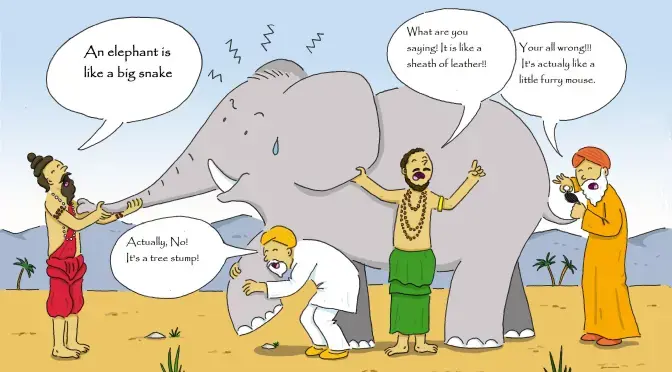4 Blind Men and an Elephant
- Karolina Manns
- Jul 11, 2025
- 2 min read
vastu-sāmye citta-bhedāt tayor vibhaktaḥ panthāḥ
Each individual person perceives the same object in a different way, according to their own state of mind and projections. Everything is empty from its own side and appears according to how you see it. PYS IV.15

Do you remember the ancient Indian story of four blind men and an elephant? Each was given a different part of the elephant to touch. One got a tusk, the others an ear, a tail and a foot. And each was totally convinced that the elephant looked exactly like the part they were given. The truth was that all of them were right: partially right.
Similarly, when I see a pen, for me it’s a pen. For my puppy dog it is a stick to chew!
When we are born, when a soul (consciousness) enters the physical body, it becomes constricted by the physical form and by the senses: the sense of smell, touch, taste, sight and hearing. The five senses are like a filter that make everything subjective. Imagine someone who is colour blind or deaf. He will perceive the world in a very different way to someone who’s not.
How we feel at a particular moment in time might determine how we think of a person or a situation that we’re in. If you are hungry or thirsty or tired, you will not enjoy whatever you are about to do as much as if you were not.
On top of it, everything is flowing, it’s changing. How you feel about something today is different to what you might believe in tomorrow.
So how do we navigate the challenge of the constantly fluctuating mind? Through the practice of yoga, we become Sākṣī “witness”.

The concept of an “observer” refers to the Pure Awareness that witnesses the world but does not get affected by it. It doesn’t mean that we become numb or detached from the world. Rather, instead of being reactionary, we mindfully choose the way we want to act, and through assimilation of this sutra, act accordingly, equipped with the knowledge that there are always two sides of the coin. We look beyond our small ego and try to see the big picture.
After all, as David Life, the co-founder of Jivamukti Yoga said: Would you prefer to be right, or to be free?
There is no such thing as ultimate truth, we are all seeing a different version of the same story. We can continue to argue and in effect create more suffering not just for others but ultimately for ourselves. However, when we become a witness, we release ourselves from the shackles of our egos, and instead of labelling things, including our identity, we realise that everything just is.
And maybe that’s what the ultimate liberation and freedom looks like. Or just is.


Comments